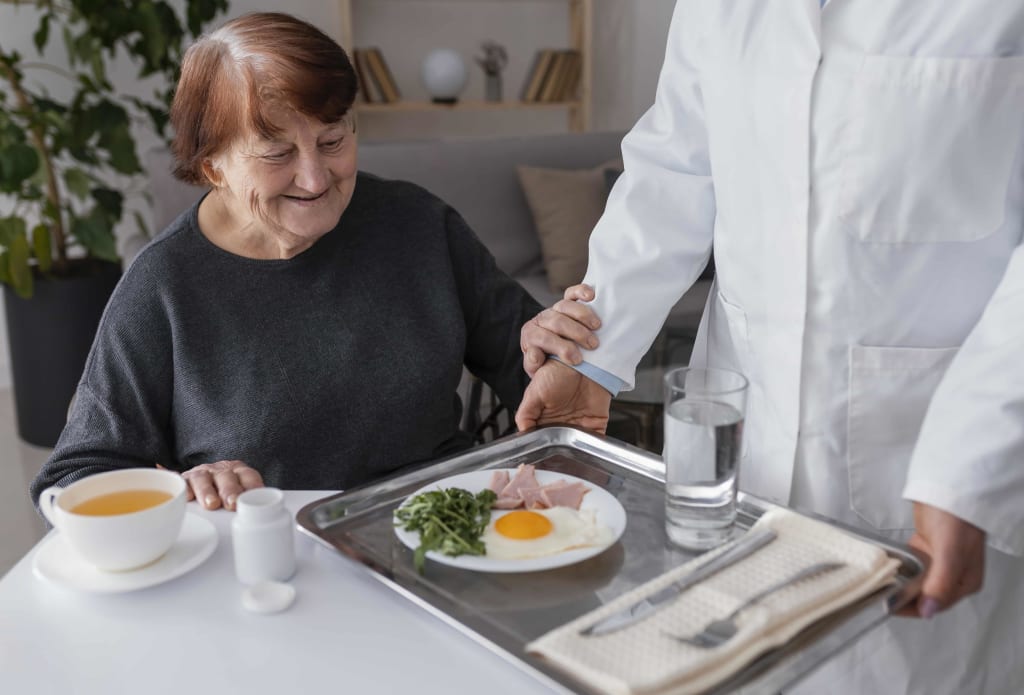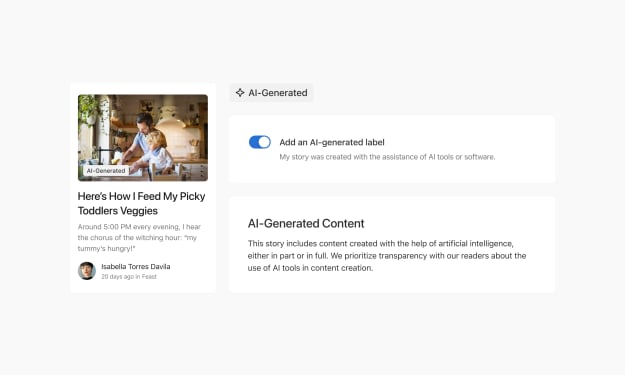The Importance of Nutrition in Home Care and Healthcare Settings
Health care

Nutrition is vital in maintaining health and well-being, particularly for older adults. Proper nutrition can help prevent and manage various health conditions, improve cognitive function, and enhance the quality of life.
When people hire home care services, they expect the carer to look after their vulnerable family member. It includes checking up on their medicines, diet, and overall well-being. As a caregiver, your job is more than just checking up on their medication. You have to check their diets as well regularly.
This article will discuss nutrition's importance in-home care and healthcare settings. We'll also offer tips for promoting healthy eating habits among older adults.
Importance of Nutrition in Home Care &Nursing Home Settings
Our bodies' requirements for a balanced and nutritious diet change as we age. This diet also helps us stay active. Older adults are at an increased risk of malnutrition. In-home care and nursing home settings, older adults may face additional challenges getting the nutritious diet they need. Many individuals in these settings may have difficulty preparing meals or eating independently. It can have serious consequences for their health.
Poor nutritional diets can lead to various health issues, including impaired immune function, increased infection risk, and slow wound healing. It can also contribute to cognitive decline, depression, and other mental health issues. Providing varied, balanced, and nutritious food for the client is one of the most significant factors contributing to quality and nurturing care. They may require assistance or specialized diets to meet their nutritional needs.
Social interaction and other factors may also impact their appetite and eating habits.
Home care settings should understand the importance of a balanced and nutritious diet for their residents. On top of that, the Care Quality Commission (CQC) has fundamental standards that care facilities and nursing homes must adhere to. These standards include an ideal source of food and drink for the vulnerable members.
Essentially, "healthy" food and optimum hydration are necessary for general health and sanity. As a care worker, providing your patients with adequate nutrition and hydration should be a fundamental aspect of your holistic care.
Ways to Promote Nutrition in Home Care & Nursing Home
There are several strategies to promote healthy eating habits among older adults in their homes. Some of these strategies include:
Providing Nutritious Meals & Snacks
One of the most significant aspects of nutrition is ensuring older people have access to nutritious foods and snacks throughout the day. Carers can work with dieticians and nutritionists to develop meal plans for citizens. It is so that they can have a proper diet that meets their individual needs. These meals and snacks should be well-balanced and include various food items from each food group.
In addition to offering a variety of foods, the meals should include all nutrition-rich foods:
• Fruits and vegetables
• Dairy products
• Food and drink items consist of fibre, healthy fats, minerals, and vitamins
• Multigrain bread, potatoes, and other starchy food items
• Meat, eggs, fish, beans, and other non-dairy sources of protein
Besides this, carers should provide only freshly prepared, nutritional, and varied food (along with some treats) to ensure their residents are happy, fit, and mentally and physically healthy. These meals should be freshly prepared on-site under the supervision of a qualified professional chef.
Awareness Among Patients & Carers
Under nutrition among home care residents is serious and can have serious consequences. Your diet not only influences your body weight; it also impacts your mood, concentration levels, and feelings. Awareness among both patients and carers is another essential element in promoting a nutritious diet in-home care and other care settings. In-home settings and the carer can modify kitchen staff activities and management to promote nutrition.
Policymakers should also develop effective policies and legal frameworks to confront malnutrition as a public health concern. Moreover, when caring for older adults, you should know that your residents will not only depend on you for meals and drinks but also assistance with eating and drinking.
Encourage Socialization During Meals
Irrespective of our ages, eating a healthy, nutritious diet is one of the essential factors contributing to our fitness. The human body works best when it consumes all the necessary vitamins and minerals. A well-balanced diet ensures an optimum nutrition level and helps maintain a healthy weight, making it easier to stay active.
Unfortunately, many older people in care homes and home care settings may experience isolation. This sense of isolation can result in depression and anxiety. It, in turn, affects their appetite and eating habits. On the contrary, seniors who eat together in a group feel more involved and happy than those who eat alone. It helps them stay mentally alert and stave off Alzheimer's or dementia.
Encouraging socialization during meals can enhance mood and stimulate appetite. Caregivers can facilitate group meals or encourage residents to eat together in communal dining spaces.
Offering Assistance with Eating & Drinking
Some elders may have difficulty eating and drinking, particularly if they have difficulty with fine motor skills and swallowing. Caregivers can help with meal preparation, feeding, and hydration to ensure individuals get the optimum nutrition.
Moreover, if you want the person to feed themselves, you can do a few things to avoid the risk of choking or aspirating food or drink into the airway.
• Sit in front of them. It will enhance communication.
• Use plain glasses to see what fluid is circulating into their mouth.
• Ask them to have smaller bites and sips, safer than larger bites or gulps of liquid.
• A slower pace is always better than a faster pace.
Avoid dumping food in their mouths. Allow them to eat and drink themselves. Moreover, please don't give them another bite until they swallow what they already have.
Final Thoughts –
Home care services must promote hydration by reminding and encouraging them to drink water. Remember that everyone has different dietary needs, tastes, and preferences. In light of this, you should provide them with different dietary requirements, including those for diabetics, celiac, dairy and glucose, and kidney disease. Doing this can promote a healthy, nutritious diet among your residents.
About the Creator
Guardian Angels
Guardian Angel Carers is a professional home care company in the UK that offers exceptional, high-quality care and support for your loved ones in the comfort of your own home.
Website:- https://www.gacarers.co.uk/






Comments
There are no comments for this story
Be the first to respond and start the conversation.